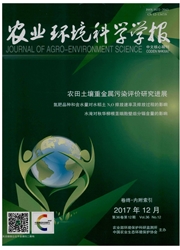

 中文摘要:
中文摘要:
采用外源一氧化氮(NO)供体硝普钠(SNP)对镉(Cd)胁迫(0.5 mmol·L-1 CdCl2)下紫花苜蓿(Medicogo sativa L.)幼苗进行预处理,分析NO对Cd胁迫下紫花苜蓿幼苗膜脂过氧化、抗氧化酶系统、渗透调节物质和Cd积累量的影响,探讨NO在植物逆境胁迫响应中的作用及其机理。结果表明:300μmol·L-1SNP显著降低Cd胁迫下紫花苜蓿幼苗相对电导率(REC)、丙二醛(MDA)含量、过氧化氢(H2O2)含量和超氧阴离子(O2-·)产生速率;400μmol·L-1SNP显著促进脯氨酸(Pro)、可溶性蛋白(SP)、类胡萝卜素(Car)的合成;200μmol·L-1SNP显著降低叶和茎中Cd含量;100μmol·L-1SNP显著降低根中Cd含量。不同浓度SNP对紫花苜蓿叶、茎和根中抗氧化酶活性的影响比较复杂:100μmol·L-1SNP显著增强叶中过氧化物酶(POD)活性、叶和茎中超氧化物歧化酶(SOD)和谷胱甘肽还原酶(GR)活性;50μmol·L-1SNP显著增强叶、茎和根中抗坏血酸酶(APX)活性;400μmol·L-1显著增强茎和根中POD活性。适当浓度的NO可以增加渗透调节物质含量和调节抗氧化酶活性,有效保护紫花苜蓿幼苗膜系统的稳定性,缓解Cd胁迫对紫花苜蓿幼苗的伤害。
 英文摘要:
英文摘要:
Nitric oxide(NO)is currently believed to play significant roles in plant responses to environmental changes. In this study, the ef-fect of exogenous nitric oxide on the membrane lipid peroxidation, osmotic regulation substances, antioxidant enzyme activities and cadmium accumulation in leaves, stems, and roots of alfalfa seedlings and its mechanisms were studied under cadmium(0.5 mmol·L-1 CdCl2)stress using sodium nitropprusside(SNP)as NO donor. Supplying 300 μmol·L-1 SNP remarkably reduced relative electric conductivity(REC), malondialdehyde(MDA)and hydrogen peroxide(H2O2)content, and superoxide anion(O-2·)-generating rate. Application of 400μmol·L-1 SNP significantly promoted the synthesis of proline(Pro), soluble protein(SP)and carotenoid(Car). The effect of SNP on activities of an-tioxidant enzymes in leaves, stems and roots of alfalfa seedlings was dependent on SNP concentrations. Treatment with 100 μmol·L-1 SNP significantly enhanced activities of peroxidase(POD)in leaves and superoxide dismutase(SOD)and glutathione reductase(GR)in leaves and stems. Applying 50μmol·L-1 SNP significantly enhanced activities of ascorbic acid oxidase(APX)in leaves, stems and roots. The POD activity in stems and roots was significantly enhanced by 400 μmol·L-1 SNP. Cadmium accumulation in leaves and stems was remarkably reduced by 200 μmol·L-1 SNP, whereas root cadmium was obviously decreased by 100 μmol·L-1 SNP. The results show that appropriate concentrations of exogenous nitric oxide could increase the content of osmotic-regulating substances and regulating activities of antioxidant enzymes to protect the membrane system stability and to alleviate Cd stress in alfalfa seedlings effectively.
 同期刊论文项目
同期刊论文项目
 同项目期刊论文
同项目期刊论文
 Accumulation of soil organic carbon during natural restoration of desertified grassland in China’s H
Accumulation of soil organic carbon during natural restoration of desertified grassland in China’s H Mongolian pine plantations enhance soil physico-chemical properties and carbon and nitrogen capaciti
Mongolian pine plantations enhance soil physico-chemical properties and carbon and nitrogen capaciti Accumulation of carbon and nitrogen in the plant-soil system after afforestation of active sand dune
Accumulation of carbon and nitrogen in the plant-soil system after afforestation of active sand dune Effects of land-use changes on organic carbon in bulk soil and associated physical fractions in Chin
Effects of land-use changes on organic carbon in bulk soil and associated physical fractions in Chin Artificial root exudates and soil organic carbon mineralization in degraded sandy grassland inNE Chi
Artificial root exudates and soil organic carbon mineralization in degraded sandy grassland inNE Chi Soil organic carbon and total nitrogen storage under different land uses in the Naiman Banner, a sem
Soil organic carbon and total nitrogen storage under different land uses in the Naiman Banner, a sem Temporal progress in improving carbon and nitrogen storage by grazing exclosure practice in a degrad
Temporal progress in improving carbon and nitrogen storage by grazing exclosure practice in a degrad 期刊信息
期刊信息
